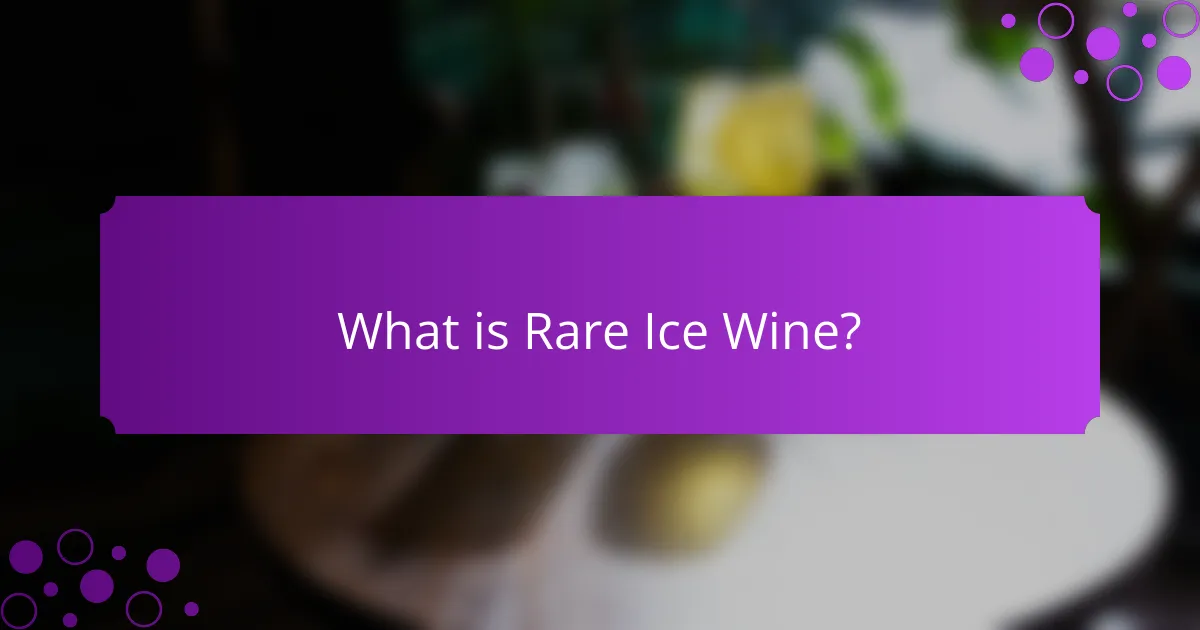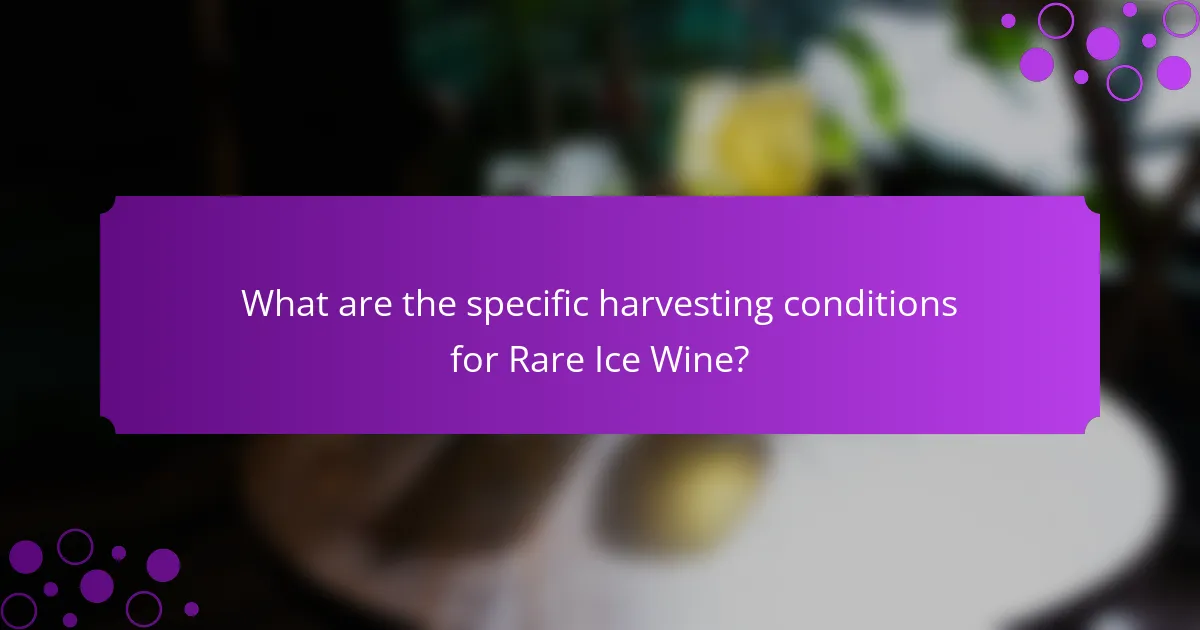
What is Rare Ice Wine?
Rare Ice Wine is a type of dessert wine produced from grapes that have been frozen while still on the vine. This winemaking process requires specific climatic conditions, typically involving temperatures of -7°C (19°F) or lower. The grapes are harvested at these low temperatures, allowing for concentrated sugars and flavors. Rare Ice Wine is known for its intense sweetness and rich, fruity profile. It is often made from varieties like Riesling or Cabernet Franc. The limited conditions for production contribute to its rarity and high market value.
How is Rare Ice Wine produced?
Rare Ice Wine is produced from grapes that have frozen on the vine. The grapes are typically harvested at night to ensure they remain frozen. They must reach a temperature of at least -7°C (19°F). Once harvested, the grapes are pressed while still frozen. This process extracts a concentrated juice. The juice is then fermented at low temperatures. This fermentation process results in a sweet, aromatic wine. Rare Ice Wine is known for its high sugar content and intense flavors.
What specific harvesting conditions are required for Rare Ice Wine?
Rare Ice Wine requires specific harvesting conditions to achieve its unique characteristics. Grapes must be harvested at temperatures of -7°C (19°F) or lower. This cold temperature allows the grapes to freeze on the vine, concentrating their sugars. The grapes are typically picked at night to ensure they remain frozen.
Harvesting during this period is crucial as it prevents the grapes from thawing before pressing. The process must be completed quickly to maintain the integrity of the frozen grapes. Additionally, the grapes used for ice wine must be overripe, enhancing their sweetness. These conditions are essential for producing the high sugar content and distinct flavors associated with Rare Ice Wine.
How do temperature and timing affect the production of Rare Ice Wine?
Temperature and timing are critical for producing Rare Ice Wine. The grapes must be harvested when temperatures drop to at least -7°C (19°F). This cold temperature ensures that the water in the grapes freezes, concentrating the sugars and flavors. Timing is essential as grapes need to remain on the vine until the optimal freezing conditions occur.
Harvesting too early results in lower sugar levels and less flavor complexity. Delaying the harvest can lead to overripening, which can spoil the grapes. The ideal timing often varies by region and climate but generally occurs in late December to January.
Producers monitor weather forecasts closely to determine the perfect moment for harvest. This careful timing ensures the grapes achieve the desired sweetness and acidity balance. The combination of low temperatures and precise timing ultimately defines the quality and rarity of Ice Wine.
What are the unique characteristics of Rare Ice Wine?
Rare Ice Wine is distinguished by its unique production process and flavor profile. It is made from grapes that are naturally frozen on the vine. The freezing process concentrates the sugars and flavors within the grapes. This results in a rich, sweet wine with high acidity. Rare Ice Wine often exhibits complex aromas, including notes of stone fruits and honey. The limited production due to specific climatic conditions adds to its rarity. Typically, only certain grape varieties, like Riesling or Vidal, are used. The wine is usually produced in small quantities, making it a sought-after delicacy.
How does the sweetness profile of Rare Ice Wine vary?
The sweetness profile of Rare Ice Wine varies based on the grape variety and harvesting conditions. Ice Wine is made from grapes that have been naturally frozen on the vine. The freezing process concentrates the sugars in the grapes. Different grape varieties yield different levels of sugar, affecting sweetness. For example, Riesling Ice Wine typically has higher sugar content compared to Vidal. The climate and timing of the harvest also influence sweetness. Colder temperatures can lead to more concentrated sugars. Additionally, the winemaking process can alter the final sweetness, such as through the use of specific fermentation techniques. Therefore, the sweetness profile can range from moderately sweet to intensely sweet, depending on these factors.
What factors influence the flavor complexity of Rare Ice Wine?
The flavor complexity of Rare Ice Wine is influenced by several key factors. These include the grape variety used, the climatic conditions during the growing season, and the harvesting process. Different grape varieties contribute distinct flavor profiles. For instance, Riesling grapes often yield floral and fruity notes. Climatic conditions, such as temperature fluctuations and frost, affect the sugar concentration in the grapes. Higher sugar levels lead to richer flavors in the final product. The harvesting process, particularly the timing and method, also plays a crucial role. Grapes are typically harvested at night when temperatures are low. This preserves acidity and enhances flavor complexity. Overall, the interplay of these factors results in the unique taste of Rare Ice Wine.

What are the specific harvesting conditions for Rare Ice Wine?
Rare Ice Wine is produced from grapes that are harvested at extremely low temperatures, typically below -7°C (19°F). These conditions allow the grapes to freeze on the vine. The freezing process concentrates the sugars and acids in the grapes. Harvesting usually occurs during the night or early morning to maintain the low temperature. This method ensures that the grapes remain frozen until they are pressed. The freezing process can lead to a lower yield due to the small amount of juice extracted. Regions known for Rare Ice Wine, such as Canada and Germany, have specific climatic conditions that support these harvesting practices. The combination of frost and selected grape varieties, like Riesling or Vidal, enhances the wine’s unique sweetness and flavor profile.
Why are freezing temperatures crucial for harvesting Rare Ice Wine?
Freezing temperatures are crucial for harvesting Rare Ice Wine because they ensure the grapes freeze on the vine. This freezing process concentrates the sugars and flavors in the grapes. The ideal temperature for harvesting is typically around -7°C (19°F) or lower. At these temperatures, the water within the grapes crystallizes, leaving behind a higher sugar concentration. This results in a sweet, rich wine with intense flavors. Additionally, the freezing conditions prevent the grapes from fermenting before harvest. This unique harvesting method is essential to produce the distinctive profile of Ice Wine.
What climatic conditions are ideal for producing Rare Ice Wine?
Ideal climatic conditions for producing Rare Ice Wine include cold temperatures and specific humidity levels. The grapes must freeze on the vine, typically at temperatures below -8°C (17.6°F). This allows for the concentration of sugars and flavors in the grapes. Ideal conditions also involve sunny days that help develop the grapes’ acidity and sweetness. Regions with a continental climate, such as parts of Canada and Germany, are particularly suitable. These areas experience cold winters and warm summers, which contribute to the optimal growing conditions for the grapes used in ice wine production.
How does soil type impact the quality of Rare Ice Wine grapes?
Soil type significantly impacts the quality of Rare Ice Wine grapes. Different soil compositions affect drainage, nutrient availability, and vine health. Well-draining soils prevent excess moisture, which is crucial during late harvest. Nutrient-rich soils can enhance the flavor profiles of grapes. Specific minerals in the soil can contribute to the unique taste of the wine. For example, limestone soils often produce grapes with higher acidity. This acidity is essential for balancing the sweetness in Ice Wine. Studies show that vineyards with varied soil types yield grapes with distinct flavor characteristics. Thus, the interaction between soil type and grape quality is critical in producing high-quality Rare Ice Wine.
What harvesting techniques are used for Rare Ice Wine?
Rare Ice Wine is produced using specific harvesting techniques that ensure the grapes are frozen at optimal temperatures. Grapes are typically harvested late in the season, often after the first frost. This allows the sugars to concentrate while the water content freezes. The grapes must be picked by hand, ensuring they are not damaged during the process. Harvesting occurs early in the morning when temperatures are still low. This prevents the grapes from thawing before pressing. The pressing of frozen grapes results in a small amount of highly concentrated juice. This technique is essential for achieving the unique sweetness and flavor profile of Rare Ice Wine.
How do hand-picking methods affect the quality of Rare Ice Wine?
Hand-picking methods significantly enhance the quality of Rare Ice Wine. This technique allows for the selection of only the ripest and healthiest grapes. Hand-picking reduces the risk of damage to the fruit, preserving its integrity. Intact grapes lead to higher sugar concentrations and better flavor profiles. Additionally, careful selection prevents the inclusion of undesirable or botrytis-affected grapes. Studies show that grapes harvested by hand yield wines with more complex flavors and aromas. The meticulous process ensures that only the best fruit is used, contributing to the wine’s overall excellence.
What role does timing play in the harvesting process for Rare Ice Wine?
Timing is crucial in the harvesting process for Rare Ice Wine. The grapes must be harvested after temperatures drop to at least -7°C (19°F). This cold temperature allows the grapes to freeze on the vine. Freezing concentrates the sugars and flavors, enhancing the wine’s sweetness. Harvesting too early results in lower sugar levels. Harvesting too late can lead to over-ripening and spoilage. Therefore, precise timing ensures optimal sugar concentration. This process is unique to ice wine production, distinguishing it from other wine types.